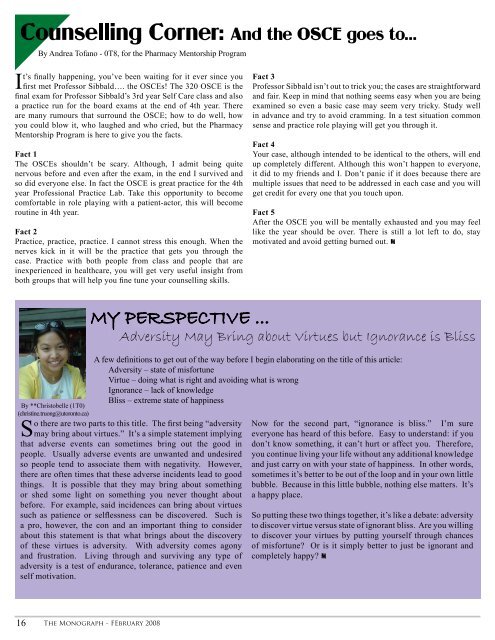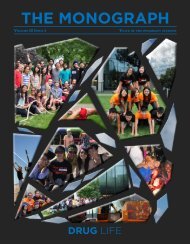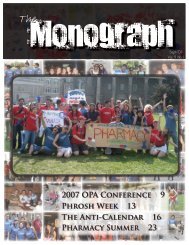February - University of Toronto's Undergraduate Pharmacy Society
February - University of Toronto's Undergraduate Pharmacy Society
February - University of Toronto's Undergraduate Pharmacy Society
Create successful ePaper yourself
Turn your PDF publications into a flip-book with our unique Google optimized e-Paper software.
It’s finally happening, you’ve been waiting for it ever since you<br />
first met Pr<strong>of</strong>essor Sibbald…. the OSCEs! The 320 OSCE is the<br />
final exam for Pr<strong>of</strong>essor Sibbald’s 3rd year Self Care class and also<br />
a practice run for the board exams at the end <strong>of</strong> 4th year. There<br />
are many rumours that surround the OSCE; how to do well, how<br />
you could blow it, who laughed and who cried, but the <strong>Pharmacy</strong><br />
Mentorship Program is here to give you the facts.<br />
Fact 1<br />
The OSCEs shouldn’t be scary. Although, I admit being quite<br />
nervous before and even after the exam, in the end I survived and<br />
so did everyone else. In fact the OSCE is great practice for the 4th<br />
year Pr<strong>of</strong>essional Practice Lab. Take this opportunity to become<br />
comfortable in role playing with a patient-actor, this will become<br />
routine in 4th year.<br />
Fact 2<br />
Practice, practice, practice. I cannot stress this enough. When the<br />
nerves kick in it will be the practice that gets you through the<br />
case. Practice with both people from class and people that are<br />
inexperienced in healthcare, you will get very useful insight from<br />
both groups that will help you fine tune your counselling skills.<br />
Fact 3<br />
Pr<strong>of</strong>essor Sibbald isn’t out to trick you; the cases are straightforward<br />
and fair. Keep in mind that nothing seems easy when you are being<br />
examined so even a basic case may seem very tricky. Study well<br />
in advance and try to avoid cramming. In a test situation common<br />
sense and practice role playing will get you through it.<br />
Fact 4<br />
Your case, although intended to be identical to the others, will end<br />
up completely different. Although this won’t happen to everyone,<br />
it did to my friends and I. Don’t panic if it does because there are<br />
multiple issues that need to be addressed in each case and you will<br />
get credit for every one that you touch upon.<br />
Fact 5<br />
After the OSCE you will be mentally exhausted and you may feel<br />
like the year should be over. There is still a lot left to do, stay<br />
motivated and avoid getting burned out.<br />
By **Christobelle (1T0)<br />
(christine.truong@utoronto.ca)<br />
A few definitions to get out <strong>of</strong> the way before I begin elaborating on the title <strong>of</strong> this article:<br />
Adversity – state <strong>of</strong> misfortune<br />
Virtue – doing what is right and avoiding what is wrong<br />
Ignorance – lack <strong>of</strong> knowledge<br />
Bliss – extreme state <strong>of</strong> happiness<br />
So there are two parts to this title. The first being “adversity<br />
may bring about virtues.” It’s a simple statement implying<br />
that adverse events can sometimes bring out the good in<br />
people. Usually adverse events are unwanted and undesired<br />
so people tend to associate them with negativity. However,<br />
there are <strong>of</strong>ten times that these adverse incidents lead to good<br />
things. It is possible that they may bring about something<br />
or shed some light on something you never thought about<br />
before. For example, said incidences can bring about virtues<br />
such as patience or selflessness can be discovered. Such is<br />
a pro, however, the con and an important thing to consider<br />
about this statement is that what brings about the discovery<br />
<strong>of</strong> these virtues is adversity. With adversity comes agony<br />
and frustration. Living through and surviving any type <strong>of</strong><br />
adversity is a test <strong>of</strong> endurance, tolerance, patience and even<br />
self motivation.<br />
Now for the second part, “ignorance is bliss.” I’m sure<br />
everyone has heard <strong>of</strong> this before. Easy to understand: if you<br />
don’t know something, it can’t hurt or affect you. Therefore,<br />
you continue living your life without any additional knowledge<br />
and just carry on with your state <strong>of</strong> happiness. In other words,<br />
sometimes it’s better to be out <strong>of</strong> the loop and in your own little<br />
bubble. Because in this little bubble, nothing else matters. It’s<br />
a happy place.<br />
So putting these two things together, it’s like a debate: adversity<br />
to discover virtue versus state <strong>of</strong> ignorant bliss. Are you willing<br />
to discover your virtues by putting yourself through chances<br />
<strong>of</strong> misfortune? Or is it simply better to just be ignorant and<br />
completely happy?<br />
16<br />
The Monograph - FEbruary 2008

















